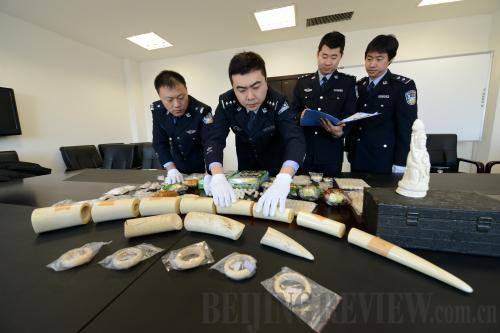United Front for Conservation
Beijing Review, February 17, 2014 Adjust font size:
Countries in Asia, Africa and North America are joining forces in cracking down on wildlife crime
A cross-continent operation against illegal wildlife trade was conducted secretly from December 30, 2013 to January 26, 2014.
The operation, code-named Cobra II, was co-organized by China, the United States, South Africa, the Lusaka Agreement Task Force (LATF), the ASEAN Wildlife Enforcement Network and the South Asia Wildlife Enforcement Network, along with the support of the Convention on International Trade in Endangered Species of Wild Fauna and Flora (CITES), the World Customs Organization and Interpol.
The global crackdown focused on key species that are subject to illegal trade and achieved "excellent" results, according to John E. Scanlon, Secretary General of the CITES.
Huge success
Operation Cobra II led to conclusions of more than 350 cases and the arrest of over 400 suspects. Seized illegal animal products included more than 3 tons of raw ivory and ivory products, 1,000-plus hides, 36 rhino horns and a large number of other wildlife products, according to the China Endangered Species Import and Export Management Office.
The operation was participated in by 28 countries in total, while the first Cobra operation launched a year earlier involved 22 countries. "Six more countries were involved this year, resulting in even greater cooperation," said Wan Ziming, Director of the Law Enforcement Department with the China Endangered Species Import and Export Management Office.
According to Wan, China played a leading role in carrying out Operation Cobra II. China's forestry, customs, police, judiciary and quarantine authorities assigned more than 100,000 staff on the operation, and uncovered over 200 cases involving more than 350 suspects, which ended up accounting for more than half of all cases cracked.
For the first time, China sent enforcement staff to Kenya to arrest a man suspected of ivory trafficking and to host lectures on wildlife protection.
"The success of Operation Cobra II came from the coordination, cooperation and intelligence generated to combat wildlife crime syndicates," said Bonaventure Ebayi, Director of the LATF. The task force is an inter-governmental organization with the main function of facilitating cooperative activities in/among the party states to the Lusaka Agreement, in carrying out investigations on violations of national laws pertaining to illegal trade in wild fauna and flora.
Ebayi added, "As much as the seizures of contraband were welcomed, the real impact was in the intelligence gained, networks developed and the number of investigations, arrests and prosecution of the suspects behind these illegal shipments."



